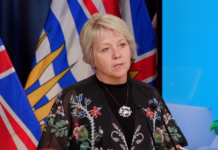TO help stop overdoses and save lives, Dr. Bonnie Henry, Provincial Health Officer, on Wednesday issued a public health order to increase the number of health professionals authorized to help people at risk for overdose access safer alternatives to the toxic street drug supply, as B.C. works to update prescribing guidance.
“We know the pandemic has only made the street drug supply in B.C. more toxic than ever, putting people who use drugs at extremely high risk for overdose,” Henry said. “Giving physicians and nurse practitioners the ability to prescribe safer pharmaceutical alternatives has been critical to saving lives and linking more people to treatment and other health and social services. I am issuing a provincial health officer order to expand the health professionals who are able to provide safer, accessible alternatives to the toxic street drug supply and help more people find their pathway to hope.”
The order, issued under the Health Professions Act, authorizes registered nurses and registered psychiatric nurses to prescribe pharmaceutical alternatives to street drugs to help separate more people from the poisoned street drug supply to save lives and provide opportunities for ongoing care, treatment and support. New nursing standards will be introduced, along with training and education, and access to expert consultation and pathways to connect people to broader addictions and primary care.
“Before the COVID-19 pandemic began, B.C. was making progress and overdose deaths were coming down for the first time since 2012,” said Judy Darcy, Minister of Mental Health and Addictions. “We’re seeing these tragic spikes in deaths across Canada, but I’m proud that we’re the only government responding across the full continuum of care by providing more overdose prevention services and outreach teams, doubling youth treatment beds, increasing adult beds and counselling services. And today, we’re announcing a significant expansion of access to safer prescription alternatives to the toxic drug supply. Each life lost to overdose is a tragedy and we are taking every preventative measure possible to save more lives and connect more people to treatment and supportive services.”
In addition to the public health order, the Ministry of Mental Health and Addictions and the Ministry of Health are working with the Office of the Provincial Health Officer to develop an updated policy directive for prescribers and health authorities, which builds on the existing risk mitigation clinical guidance released in March 2020 in partnership with the BC Centre on Substance Use.
The policy directive is being urgently finalized and is expected to be released as soon as possible in order to:
- expand eligibility criteria to prioritize reducing overdose events and deaths, and reach individuals with opioid-use disorder, other substance-use disorders or individuals with a history of accessing the toxic street drug supply who are at high risk of overdose and other drug-related harms;
- carefully expand the types of medications that can be prescribed and dispensed by doctors, pharmacists and nurses;
- increase access points to allow for dispensing medications from health authorities and community pharmacies; and
- continue to commit to ongoing evaluation and monitoring and support evidence-based care planning.
The policy will continue to place a strong emphasis on clinicians working with people who use drugs on their individual goals, including opportunities – as people stabilize – to access substance-use services, such as harm reduction, treatment, counselling and mental health supports and recovery-oriented services.
People with substance-use disorder and addictions can currently access safer pharmaceutical alternatives by talking to their doctor, nurse practitioner, community care team or by calling 811. People will be engaged by trained clinicians who follow core principles and standards of care, including culturally safe practices and trauma-informed care that put people’s needs and goals first.
This work is part of the B.C. government’s plan to build the comprehensive system of mental health and addictions care that British Columbians deserve, as outlined in A Pathway to Hope, B.C.’s roadmap for making mental health and addictions care better for people in British Columbia.
Sherri Kensall, interim Board Chair, Nurses and Nurse Practitioners of BC, said: “The Association of Nurses and Nurse Practitioners of BC is very pleased with the decision to expand the group of health professionals that can prescribe pharmaceutical alternatives to street drugs by including registered nurses and registered psychiatric nurses. In doing this, we have taken an important step in leveraging nursing knowledge by expanding scope in such a way that will have a direct and beneficial impact on harm reduction. Every day British Columbians are losing their lives to a crisis that has only accelerated in the current COVID-19 pandemic. Nurses stand ready at all levels to interact with people who use substances and will utilize supportive harm reduction, coupled with increased prescriptive authority as well as expanded access to referral for ongoing treatment and support to save countless lives.”
Dr. Kathleen Ross, President, Doctors of BC, added: “Increasing prescribing access for this high-risk population to allied health-care providers working on the ground makes logistical sense, and we hope that by expanding team-based care to include RNs working in this field, more lives will be saved during the overdose crisis. We support these game-changing treatment options, and hope that as we proceed, a viable partnership among all health care providers working in this environment will help to identify and change any areas that aren’t working. We must be able to meet the needs of patients.”
Quick Facts:
- On March 26, the Province and the British Columbia Centre on Substance Use released interim clinical prescriber guidance to help people living with addictions stay safe during COVID-19.
- In August, there was a 259% increase in dispensed hydromorphone for patients from a pharmacy compared to March 2020.
- More than 3,000 clinicians have attended webinars about the new guidance since it was introduced in March 2020.
- Prior to COVID-19, illicit drug overdose deaths were declining for the first time since 2012.
- The BC Centre for Disease Control estimates that nearly 6,000 deaths have been averted since April 2016 due to lifesaving supports put in place, including increased distribution of naloxone, the establishment of more overdose preventions sites and improved access to medication-assisted treatment.













